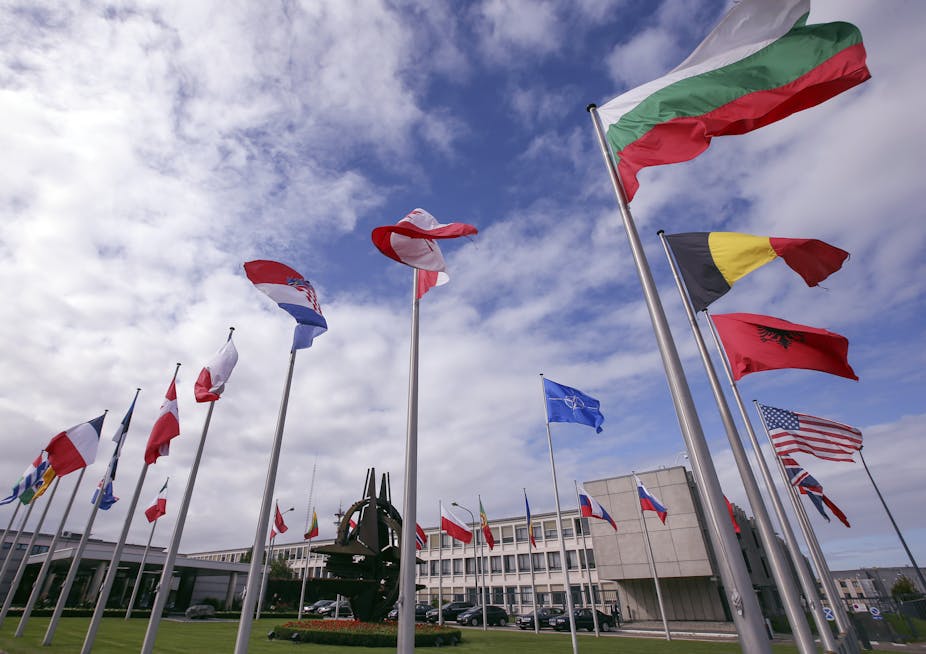World leaders are congregating in Wales this week for the 2014 NATO summit, where some of the most pressing political issues of the day will be on the agenda. Despite the high stakes, a survey of the general public in the UK and France shows only about a third see NATO as the most important component to their nation’s defence.
The survey of 4,027 people in the UK and 6,045 people in France was carried out in May 2014, just after Russia annexed Crimea and tensions in the region were high. Only 33% of respondents in the UK and 31% in France agreed that NATO was the bedrock of their security, presumably preferring to see their own nation’s forces as more important.
That said, the public doesn’t necessarily want to leave NATO. A total of 55% of Britons thought that leaving NATO would pose a security risk. The French were less convinced, with 42% agreeing on this point.

Overall, it seems the British public takes a more favourable view of NATO than the French. A slight majority of UK respondents (51%) favoured greater military co-operation between NATO and their own military. The appeal of this option is slightly lower in France, at 45%. Perhaps French respondents remember that their country did not suffer any substantive harm when President de Gaulle kicked NATO troops out of the country in the late 1960s and withdrew French forces from the centralised NATO command structure.
The Russia question
The NATO summit is likely to be heavily dominated by talk of Eastern Europe and its borders. Given Russian incursions in Ukraine, this summit has the potential to serve as a turning point. After the fall of the Soviet Union, relations between NATO and Russia calmed but member states could well push to reaffirm the original aim of NATO – to protect members against Russian aggression.
Recent entrants into NATO, such as Estonia, Latvia and Lithuania have been made nervous by Russian bellicosity and are seeking credible commitments from Western powers that they will be protected. They hope to see Britain and France vocally pledging to uphold article five of the North Atlantic Treaty, which says that members must see an armed attack against one of their group as an aggression against them all.
Poland has already asked for up to 10,000 NATO troops to be stationed on its territory and plans appear to be afoot to send troops from Western NATO members to bases in the Baltic states.
The expansion of NATO activity in Eastern Europe is indeed a challenge to the NATO-Russia Founding Act of 1997, which was agreed by former Russian President Boris Yeltsin and the leaders of the 15 countries that were members of NATO at the time. The act set the tone for relations between Russia and NATO nations in the post-Cold War era and, most importantly, contained a limited pledge by NATO that it would not deploy nuclear weapons or a significant number of troops in the Eastern European nations that were soon to join the alliance.
Only one third of British and French respondents believed that expanding NATO troops into Eastern Europe would serve to provoke Russia. But they didn’t show great enthusiasm for sending troops from their own country into the area. Among the Britons, less than half agreed that national forces to be sent East as part of a NATO force and there was even less support in France, where just 30% though French troops should go.
It could be that some respondents support expansion of the alliance in principle but balk at specific actions that could be taken by Russia as a sign of aggression. But it might also be that the public has not really thought much about the obligations Western powers assumed when they agreed to let more nations into NATO.
NATO has been involved in military operations throughout much of the post-Cold War period, including in Bosnia, Kosovo, Afghanistan, and Libya, but they don’t often make the headlines. Public awareness of NATO’s military role appears low, potentially as a result.
We know from previous studies on such “distant” topics that sentiments can shift quickly, though. Public opinion could change on these issues if significant coverage is given to the issues being discussed at NATO. And with the world watching Russia, that just might happen.
NATO is one of these “taken for granted” international organisations which don’t commonly register with the public unless there is a crisis. The murder of hostages in Iraq and the situation in Ukraine are raising its profile and, in a sense, giving it a new lease of life. This could well change public opinion about interventions and any potential decisions about putting boots on the ground in these areas.

